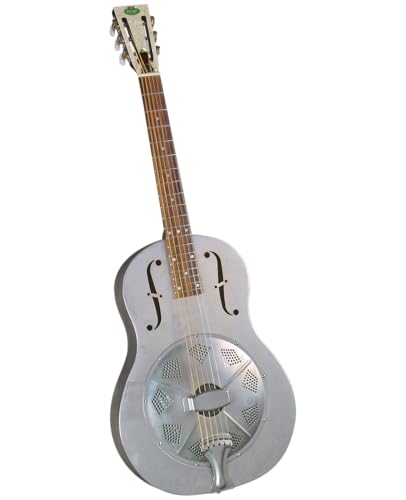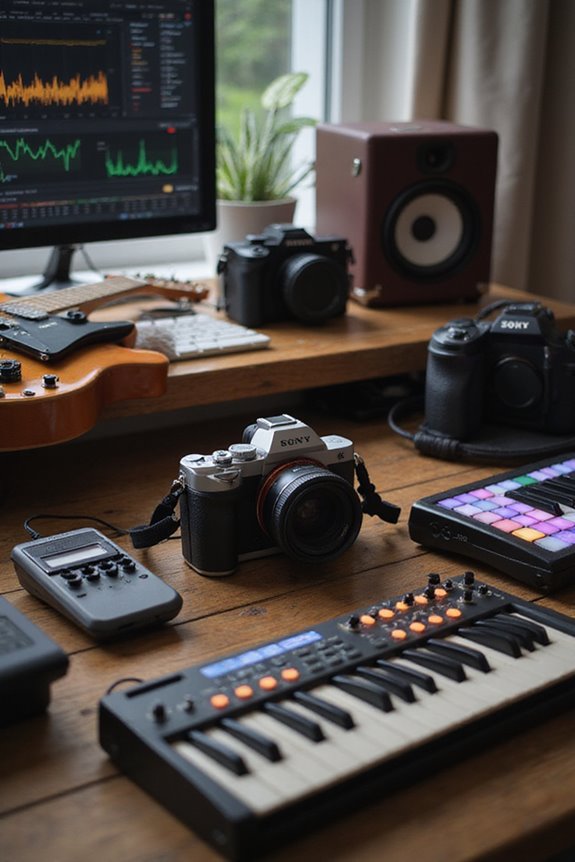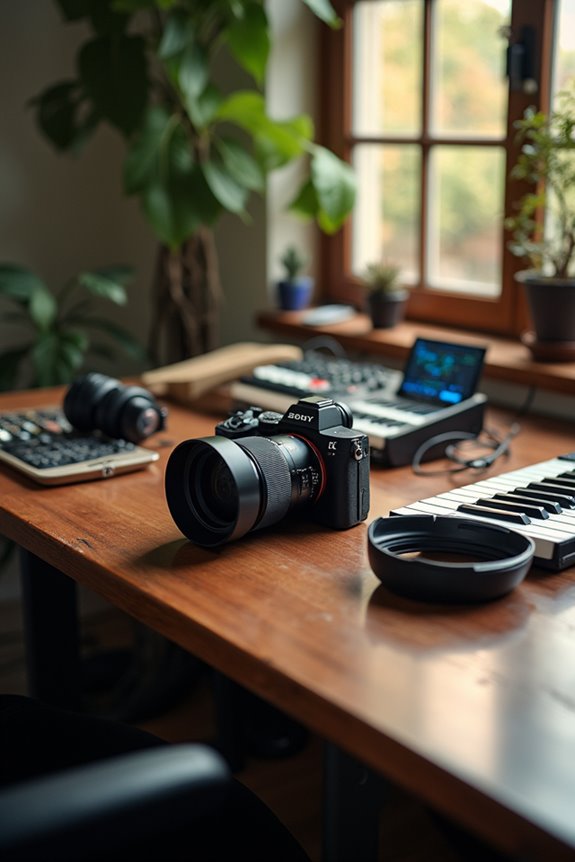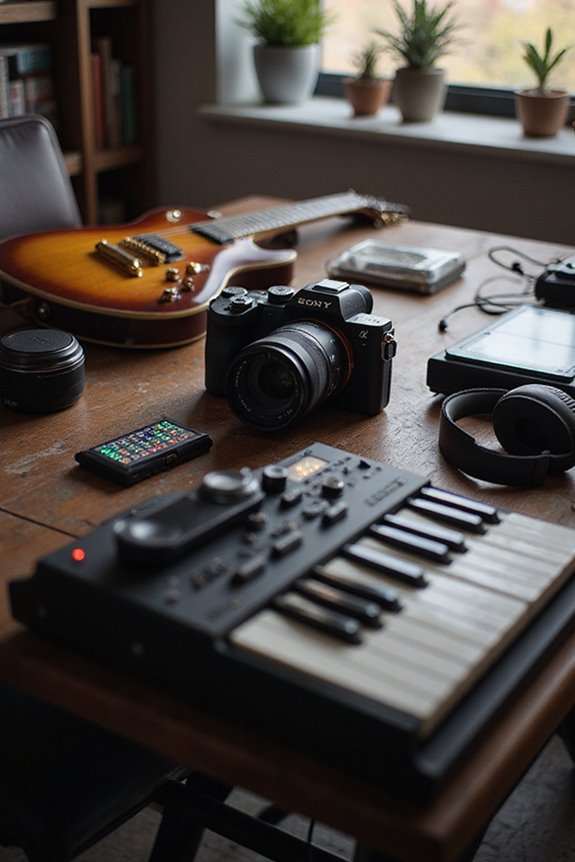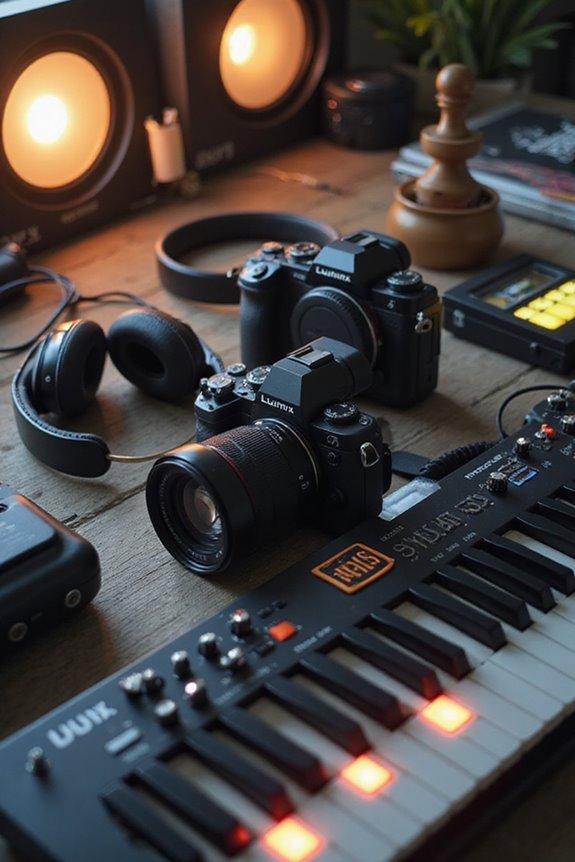As an Amazon Associate, we earn from qualifying purchases. Some links may be affiliate links at no extra cost to you. Although our opinions are based on curated research, we haven't used these products. Articles generated with AI.
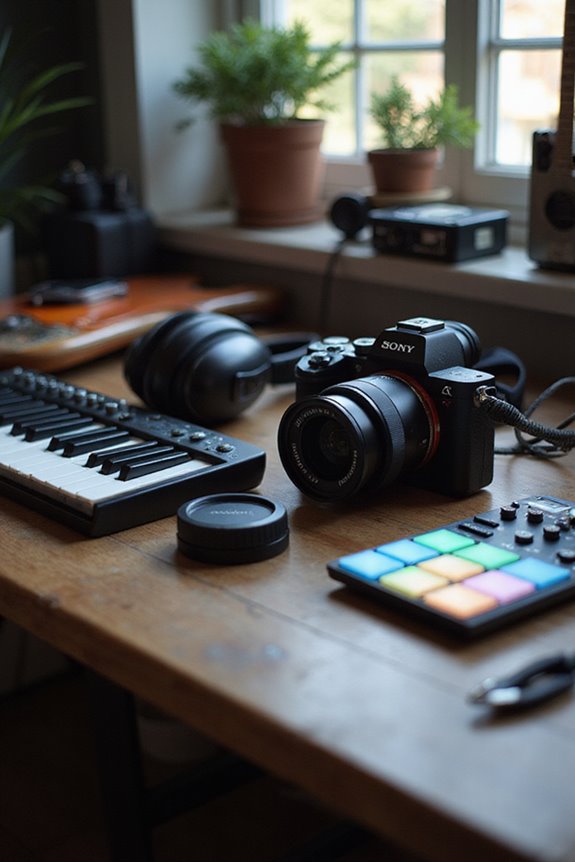
5 Best Resonator Guitars With Metal Bodies for Unmatched Sound and Style
If you’re looking for the best resonator guitars with metal bodies, consider the RC-43 Triolian for its vintage vibe and affordability. The Gretsch LTD Roots Honey Dipper excels in vintage blues tones, while the Fender PR-180E offers a two-year warranty and warm sound. The Recording King 6 String is lightweight and portable, perfect for performances. Finally, the RC-56 Tricone adds visual flair with its copper finish. Explore these options to find your ideal instrument and discover more on making the right choice.
Key Takeaways
- The RC-43 Metal Body Triolian Guitar offers an affordable vintage sound with a comfortable slim neck and mixed quality reports.
- The Gretsch LTD Roots Honey Dipper boasts a heavy bell brass body, projecting rich vintage tones, but has limited customer ratings.
- Fender PR-180E features all-mahogany construction and excellent sound quality, ideal for Delta Blues, though some fit and finish issues may arise.
- Recording King 6 String Resonator provides exceptional craftsmanship in a lightweight design, perfect for portability but with limited color options.
- The RC-56 Metal Body Tricone combines traditional aesthetics with rich sound quality, but reviews on value and scratches can be mixed.
RC-43 Metal Body Triolian Guitar – Antiqued Nickel-Plated Steel
Regal RC-43 Metal Body Triolian Guitar - Antiqued Nickel-Plated Steel
- Authentic steel Triolian style body with antiqued nickel-plated finish provides a rich vintage tone and look
- Spun 9.5" aluminum resonator with biscuit bridge combines a warm pleasing voice with amazing carrying power
- Slim, comfortable mahogany neck is ideal for bottleneck and traditional playing styles
You’ll appreciate the spun 9.5 aluminum resonator and biscuit bridge, giving you warm, rounded sounds. The slim mahogany neck promotes comfortable playability for various styles. With die-cast 15:1 tuners, tuning is quick and precise, making it perfect for your next jam session.
Best For: Budget-conscious guitarists seeking a vintage aesthetic and sound without the high cost of collectible instruments.
Pros:
- Authentic vintage tone from the antiqued nickel-plated steel body and aluminum resonator.
- Comfortable playability with a slim mahogany neck that suits various playing styles, including bottleneck.
- Quick and accurate tuning with die-cast 15:1 tuners, ideal for jam sessions.
Cons:
- Mixed quality control reports, with some guitars arriving unplayable or needing significant setup adjustments.
- Possible issues with action height and fret finishing, which can impact playability.
- Inconsistent sound quality, with some users noting the need for string upgrades and proper setup for optimal performance.
Gretsch LTD Roots Honey Dipper Resonator Guitar – Weathered Bell Bronze
Gretsch LTD Roots Honey Dipper Resonator Guitar - Weathered Bell Bronze
- Biscuit Cone - Weathered Bell Bronze
- Resonat Guitar with Bell Brass Body
- Padauk Fingerboard
For those who crave the rich, resonant tones of vintage blues, the Gretsch LTD Roots Honey Dipper Resonator Guitar in Weathered Bell Bronze stands out as an exceptional choice. With its unique bell brass body and aluminum top, this guitar projects a compelling sound ideal for Delta blues enthusiasts.
Its fixed bridge and biscuit cone create a midrange tone that’s perfect for both strumming chords and intricate picking. Weighing in at 13.55 pounds, its heavy construction enhances sound quality, making it reliable for performances. In short, it’s an impressive instrument that combines vintage aesthetics with modern craftsmanship.
Best For: The Gretsch LTD Roots Honey Dipper Resonator Guitar is best for musicians seeking a high-quality instrument for playing Delta blues and other genres requiring resonant tones.
Pros:
- Unique sound quality thanks to the hand-spun Gretsch Ampli-Sonic diaphragm and heavyweight construction.
- Stunning vintage aesthetics with a retro roundneck design and weathered bell bronze finish.
- Excellent playability suited for both strumming and intricate fingerpicking styles.
Cons:
- Heavy weight (13.55 pounds) may be cumbersome for some players during long performances.
- Metal body construction might not appeal to those preferring traditional wooden guitars.
- Limited customer ratings (only 2 reviews) may make some potential buyers hesitant.
Fender PR-180E Resonator, with 2-Year Warranty Aged Cognac Burst
Fender PR-180E Resonator, with 2-Year Warranty Aged Cognac Burst
- All-mahogany construction
- Spider resonating cone
- Fishman Nashville pickup system
The Fender PR-180E Resonator, dressed in a stunning Aged Cognac Burst, stands out as an ideal choice for musicians seeking versatility and rich tonal quality. With its all-mahogany construction and spider resonating cone, this guitar delivers excellent acoustic and amplified sound. It’s particularly suited for Delta Blues and fingerstyle play, showcasing warmth, clarity, and superior sustain for bluegrass.
Featuring a comfortable ovangkol fingerboard and Fishman Nashville pickup system, you’ll enjoy seamless performances. Plus, with a 2-year warranty and a hardshell case included, you can confidently take it on the road, knowing you’re well-covered.
Best For: Musicians seeking a versatile guitar with rich tonal quality ideal for Delta Blues and bluegrass music.
Pros:
- Excellent acoustic and amplified sound quality, perfect for various music styles.
- Comfortable ovangkol fingerboard and neck profile for easy playability.
- Comes with a hardshell case and a 2-year warranty for added protection and peace of mind.
Cons:
- Some customers have reported issues with fit and finish, such as bridge saddle alignment.
- Action height might need adjustment for optimal playability, as noted by a few reviewers.
- The weight of 16 pounds may be cumbersome for some musicians during long sessions.
Recording King 6 String Resonator Guitar, Right, Matte Black (RPH-R2-E-MBK)
Dirty 30s Mini Bucker Resonator Guitar, 0 Body, Matte Black
- Pedestal Style Soundwell
- Spruce Top
- Biscuit Bridge
Renowned for its exceptional craftsmanship, the Recording King 6 String Resonator Guitar in Matte Black (RPH-R2-E-MBK) stands out as an ideal choice for both budding musicians and seasoned guitarists. Weighing just 6 pounds and featuring a compact design, this guitar is easy to handle while delivering robust sound. Its hand-spun European cone and mini humbucker pickup provide a swampy tone, perfect for blues and more. The combination of a spruce top and ovangkol fretboard enhances playability, while the unique matte finish gives it a modern edge. This resonator is tailored for versatility, whether you’re practicing at home or performing live.
Best For: Both budding musicians and seasoned guitarists looking for a versatile and stylish resonator guitar.
Pros:
- Exceptional craftsmanship providing a robust sound.
- Hand-spun European cone and mini humbucker pickup for customizable swampy tones.
- Compact and lightweight design (6 pounds) makes it easy to handle.
Cons:
- Limited availability in color finishes may not suit everyone’s taste.
- Small body design may not be ideal for players who prefer larger guitars.
- The resonance may vary depending on the player’s technique and skill level.
RC-56 Metal Body Tricone Resophonic Guitar – Copper-Plated Brass
Regal RC-56 Metal Body Tricone Resophonic Guitar - Copper-Plated Brass
- Traditional bell brass Tricone body in an attractive copper finish for a unique and appealing vintage look
- 12th fret neck joint and elegant pearloid peghead overlay add ease of playing to that pre-war look and appeal
- Slim, comfortable mahogany neck is ideal for bottleneck and traditional playing styles
When you want a resonator guitar that thrives in both performance and aesthetics, the RC-56 Metal Body Tricone Resophonic Guitar is an excellent choice. This stunning instrument features a traditional bell brass body with a stunning copper finish, enhancing its visual appeal. With a slim mahogany neck and a pearloid peghead overlay, you’ll find it comfortable to play.
The robust construction includes a rock maple saddle and a bone nut, which contribute to its rich sound. With precise 15:1 open-back tuners, tuning is a breeze. Weighing 9.58 pounds, it balances beautifully for live performances.
Best For: Musicians seeking a high-quality resonator guitar that excels in both sound and visual aesthetics.
Pros:
- Rich Sound: The combination of rock maple saddle and bone nut enhances the instrument’s overall tonal quality.
- Beautiful Design: The copper-plated brass body offers a stunning visual appeal, making it attractive for both performance and display.
- Comfortable Playability: The slim mahogany neck allows for easy play, suited for both novice and experienced players.
Cons:
- Weight: At 9.58 pounds, it may be heavy for some players during long performances.
- Quality Concerns: Some customers reported receiving guitars with scratches and quality issues upon delivery.
- Mixed Reviews on Value: Priced around $1,000, there are varying opinions on whether it provides value for money.
Factors to Consider When Choosing a Resonator Guitar Metal Body
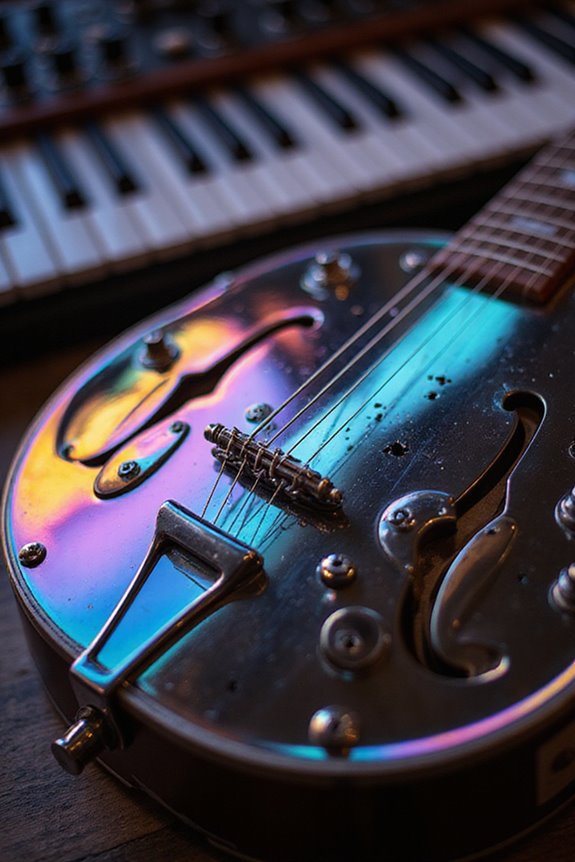
Choosing a resonator guitar with a metal body means considering several key factors to suit your playing style. You’ll want to pay attention to the material quality, body shape, and the resonator cone configuration, as these can greatly affect sound projection. Additionally, don’t underestimate neck comfort and shape—they can make a big difference in your overall playing experience.
Material Quality and Type
Finding the right resonator guitar with a metal body involves a careful examination of material quality and type, which play crucial roles in shaping your sound. The choice of metal, such as bell brass or nickel-plated steel, directly affects tonal characteristics. For instance, bell brass is renowned for its warm, resonant tones ideal for blues and bluegrass.
Don’t overlook the finish type either; antiqued or weathered finishes can enhance aesthetics while contributing to a vintage sound. Additionally, consider the weight of the body, as heavier guitars—ranging from 10 to 16 pounds—often yield richer sound resonance. Finally, prioritize high-quality construction with quality materials for the neck and fretboard, as they greatly enhance tonal clarity and sustain.
Body Shape and Design
Understanding the body shape and design of a resonator guitar is essential, especially since these elements not only affect aesthetics but also greatly influence the instrument’s sound. For example, models like the Triolian and Tricone deliver unique tonal qualities based on their design and materials. Metal body resonators tend to be heavier, promoting higher volume and a rich midrange tone. The finish, whether antiqued nickel-plated steel or weathered bell bronze, impacts not just looks but warmth and brightness in sound. Additionally, consider body dimensions; smaller shapes are better for slide playing, while larger ones provide fuller tones. Finally, the choice between brass and aluminum can greatly affect sustain and responsiveness, shaping your desired sound profile.
Resonator Cone Configuration
As you explore resonator guitars, the configuration of the resonator cone plays an important role in shaping your instrument’s sound and performance. You’ll find options like single cones, offering a punchy focused sound, or tricone setups that deliver a lush, harmonically rich tone.
The material also matters—aluminum cones tend to produce a brighter sound, while brass cones create a warmer, darker vibe. Additionally, cone design influences sustain; biscuit cones are often preferred for blues, while spider cones enhance clarity and volume.
Larger conical diameters generally yield deeper low frequencies, enhancing overall volume. Remember, proper setup and alignment are vital; misalignment can cause buzzing and reduce sound quality. Prioritize your preferences for the best match!
Neck Comfort and Shape
When selecting a resonator guitar with a metal body, neck comfort and shape are crucial factors that can greatly enhance your playing experience. A slim neck profile may work wonders for players who prefer bottleneck or traditional styles, facilitating smooth chording and sliding. When you feel comfortable gripping the neck, you’ll notice less finger fatigue, especially during long sessions.
Materials like mahogany or nato affect not only the feel but also the tonal characteristics of the guitar, which can impact your playing style. Additionally, choosing fretboard materials like ovangkol or rosewood enhances your tactile experience. Finally, consider the neck joint’s position; a 12th fret neck join can improve access to higher frets, giving you better balance when playing.
Sound Projection Capabilities
The robust sound projection of resonator guitars with metal bodies stems from their unique design and materials. These guitars excel in producing high volume, perfect for genres like blues and bluegrass. The choice of materials—such as aluminum or bell brass—affects tonal quality; heavier bodies enhance midrange richness and projection.
Additionally, the resonator cone design is essential. Biscuit cones deliver a focused sound, while spider cones offer broader tonal spread. Don’t overlook the weight of the guitar; heavier models typically generate more powerful sound due to increased resonance.
Finally, fine-tuning elements like action height and string gauge can optimize your instrument’s natural capability, ensuring you deliver stunning sound in any performance setting.
Price and Value Comparison
Choosing a resonator guitar with a metal body involves weighing several critical factors, and cost often tops the list. For budget-conscious players, the RC-43 Metal Body Triolian Guitar offers vintage aesthetics at a quarter of the price of originals. If high ratings are important to you, consider the Gretsch LTD Roots Honey Dipper, which boasts a perfect 5.0-star rating and ranks sixth among acoustic resonators. For added assurance, the Fender PR-180E includes a 2-Year Warranty, protecting against potential defects. On the other hand, the RC-56 Metal Body Tricone has mixed reviews regarding its value for money despite its $1,000 price tag. Ultimately, the Recording King 6 String Resonator stands out as a competitively priced option, ranked #12 for clear value.
Frequently Asked Questions
What Genres of Music Are Best Suited for Resonator Guitars?
Resonator guitars shine in genres like blues and bluegrass, where their unique tone truly stands out. Did you know, over 40% of guitarists say they love resonators for their distinct sound? You’ll find them enhancing music with rich, resonant notes that cut through melodies. Whether you’re strumming folk tunes or playing traditional country, their metallic bodies amplify the sound, creating a vibrant texture perfect for solos or group performances. Give it a try!
How Do I Maintain My Metal Body Resonator Guitar?
To keep your metal body resonator guitar in top shape, regularly clean it with a soft, dry cloth to eliminate dust and fingerprints. Use a suitable polishing cloth for the metal parts. Check the strings for rust or wear, changing them as needed to guarantee great sound. Maintain proper humidity levels in your storage area, as excessive moisture can lead to unwanted damage. Finally, always handle it with care to avoid dents.
Can I Use Electric Guitar Strings on a Resonator Guitar?
You might find it surprising that around 80% of guitarists prefer traditional acoustic strings over electric ones for resonator instruments. While you *can* use electric guitar strings, they may not deliver the rich, resonant tone you’re after. Electric strings can be lighter and more flexible, often causing a lack of volume. For ideal sound, consider using high-quality round strings designed for resonators to enhance your playing experience.
What Amplifiers Pair Well With Resonator Guitars?
When pairing amplifiers with resonator guitars, consider options that enhance their unique sound. Tube amplifiers, like the Fender Blues Junior, deliver warmth and clarity, emphasizing your guitar’s tonal quality. Solid-state options, such as the Boss Katana, offer versatility and effects, making them great for different genres. It’s important to match your guitar’s output to the amp for peak performance. Experiment with settings to find the perfect balance and tone that resonates with you.
Are Resonator Guitars Suitable for Beginners?
Diving into music is like finding your way through a maze; you need the right tools. Resonator guitars can definitely work for beginners. Their unique sound makes learning fun and engaging. Plus, they often offer a distinct tone that captures attention. Choose models with a lighter body for easier handling. For example, the Gretsch G9200 is a great starter option. So, grab one and enjoy! You’ll quickly develop your skills.

